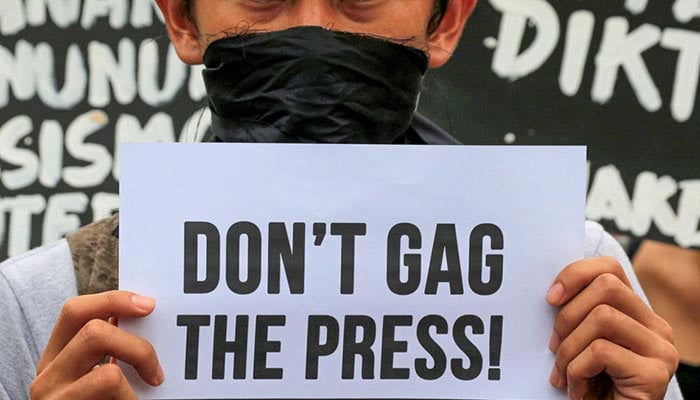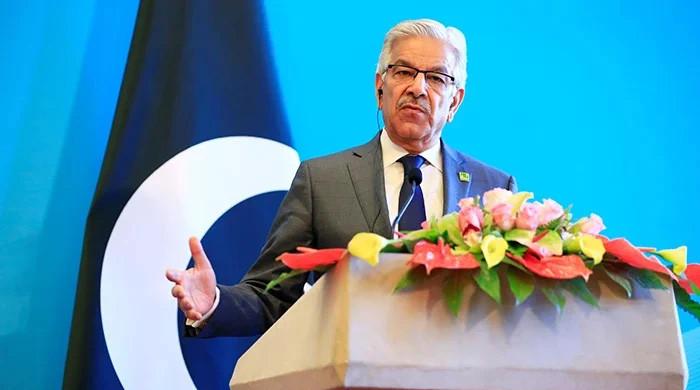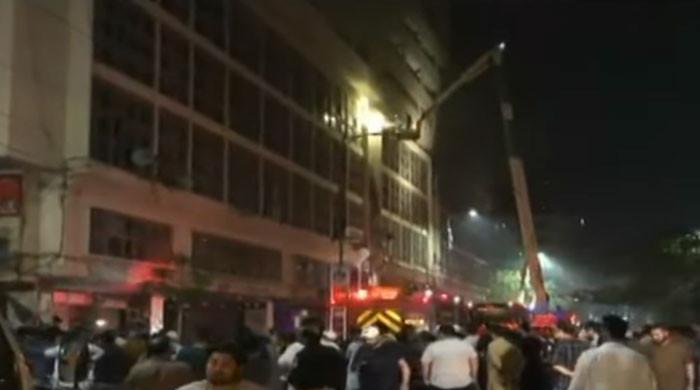Govt's attempts to 'muzzle media' through 'draconian' PMDA rejected by stakeholders
It is draconian in scope and devastating in its impact on principles and constitutional guarantees for freedom of expression: statement
August 20, 2021

- PFUJ, HRCP, PBC, DigiMAP, and other stakeholders reject PDMA.
- They also reject information minister's "false claims" of them endorsing PDMA.
- It is draconian in scope; devastating in impact on principles and constitutional guarantees: statement.
ISLAMABAD: Key stakeholders of media and civil society have completely rejected the "draconian" government proposal to create a new authority to regulate the entire spectrum of the country’s media sector, as well as its attempt to "wrongly claim support for it", a statement issued on Friday said.
The joint statement was issued by Pakistan Federal Union of Journalists (PFUJ), Human Rights Commission of Pakistan (HRCP), Pakistan Bar Council (PBC), South Asia Free Media Association (SAFMA), Asma Jahangir's AGHS, Digital Media Alliance of Pakistan (DigiMAP), Freedom Network (FN), Institute for Research, Advocacy and Development (IRADA), Digital Rights Foundation (DRF), Media Matter for Democracy (MMFD) and others oppose, all of whom rejected the PMDA and termed it "unacceptable".
"The proposed establishment of the Pakistan Media Development Authority (PMDA) by merging all existing media and sundry regulators and repealing major media-related legislation is unacceptable because this entails bulldozing existing structures and mandates for the purpose of addressing government concerns rather than reforming them," the statement said.
This joint statement is also being publicly endorsed by dozens of civil society organisations, human rights defenders, and prominent journalists, citizens, and groups, said the press release.
All key media industry associations including All Pakistan Newspaper Society (APNS), Council of Newspaper Editors (CPNE), Pakistan Broadcasters Association (PBA) and Association of Electronic Media Editors and News Directors (AEMEND) "have already outrightly rejected PMDA proposal, as have leading political parties including PPP and PML-N", the statement said.
The statement also rejected Federal Minister for Information and Broadcasting Fawad Chaudhry's repeated claims of the signatories of this statement endorsing the PDMA, as "patently false".
The signatories reiterated that "we collectively reject outrightly and oppose vehemently" the proposed PMDA that the federal government has repeatedly announced it intends to establish shortly.
"It is draconian in scope and devastating in its impact on the principles and constitutional guarantees for freedom of expression, media freedoms, right to information and human rights as well as the practise of the noble profession of journalism," the statement said.
"We believe the proposal reflects a dictatorial 'martial law mindset' hostile to the concept of people’s pluralist freedom of expression and embodies the anti-media proclivity of an army of government spokespersons that demonise the media and distribute 'certificates of treason and patriotism," the statement said.
This is unacceptable and runs contrary to rights-based constitutional democracy in which dissent is a legitimate tool of democratic exercise, the statement noted.
The government proposal includes repealing all current media-related laws including The Press Council Ordinance 2002, The Press, Newspapers, News Agencies and Books Registration Ordinance 2002, the Newspaper Employees, (Conditions of Services Acts) 1973, Pakistan Electronic Media Regulatory Authority Ordinance 2002 as amended by PEMRA Amendment Act 2007, and The Motion Pictures Ordinance 1979 and merging all the current media regulators into a single entity called Pakistan Media Development Authority (PMDA).
Instead of reforming these laws, upending the current media regulatory regime "will destroy all public media as it exists in Pakistan today, despite its myriad current complications, as the proposed PMDA is in direct contravention of Prime Minister Imran Khan’s promises of expanding freedom of expression before he took oath of office", the statement said.
The proposed PMDA is designed to "further tighten the grip of the government on all forms of media and the government is attempting to formalise a regime of coercive censorship even when it has no right to police the freedom of expression of 200 million citizens of Pakistan as guaranteed in the Constitution", it said.
"This cannot be allowed to happen as it will be tantamount to restricting digital rights and trample free speech in digital spaces and democratic diversity and socio-cultural pluralisms online," the statement said.
The statement highlighted that the government is already exercising a "coercive censorship policy on mainstream media" and since 2019 aiming to introduce "intimidating online regulations" through PEMRA and PTA which have been vehemently opposed and rejected by all stakeholders and even by national and international media watchdogs.
Pakistan continues to slip further in rankings on freedom of expression and safety of journalists and information practitioners issued by global media watchdogs such as Reporters Without Borders, International Federation of Journalists, and Committee to Protect Journalists, the statement observed.
"If the government proposal materialises in the shape of a law or ordinance, it will end up pushing Pakistan on the bottom-most world ranks of media freedoms," it warned.
By aiming to "undermine the constitutional guarantees of freedom of expression and right to information as enshrined in Articles 19 and 19-A, the proposed new PMDA law is ultra vires of the constitution", it said.
"We reject it completely and urge the government to abandon this misadventure, failing which we will be constrained to launch a countrywide movement in concert with the media industry, civil society, digital and human rights groups, parliamentarians, political parties and global media and digital rights groups to oppose it," the statement added.











